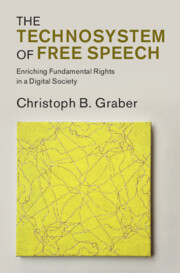Metrics
Full text views
Full text views help Loading metrics...
Loading metrics...
* Views captured on Cambridge Core between #date#. This data will be updated every 24 hours.
Usage data cannot currently be displayed.

In this book, Christoph Graber explains how the fundamental right of freedom of expression is gradually being enriched to cover its technological prerequisites. It challenges the predominant legal view that technology is merely an instrument, arguing that this overlooks the complex interplay between technological materiality and communicative sociality. It builds on a core argument of science and technology studies, that there is interpretative flexibility in both the design and social reception of a technology, which lays the groundwork for a critical stance towards smart technologies and the corporations that control them. This approach can then be transposed into the legal sphere via Luhmann's systems theory. This book shows how normative expectations about digital technologies are formed and develop into legal norms and fundamental rights. It argues that, in order to achieve the implementation of fundamental rights, it is important to recognise their dimension as objective value judgments of a constitution, which the state has a duty to protect.
‘This is a highly original book that assesses a topic of extraordinary importance. It is likely to become a central theoretical reference in legal analysis of digital technology.’
Chris Thornhill - Birmingham Law School
‘The internet is central to crises of social polarisation, identity politics, hate speech and many forms of predation. Is this technosystem hardwired for these results? Through deep scholarship and analytical clarity, Christoph Graber shows how systems of law and fundamental rights create the possibilities for better worlds. This is sociological systems thinking at its best.’
Peter Drahos - European University Institute
‘This pioneering study brilliantly combines systems theory and STS to reveal the technological preconditions of free speech. It is a much needed contribution to constitutional doctrine in the digital age and shows how legal analysis must evolve to meet the normative challenges of new media – drawing the path of the law into the future!’
Dan Wielsch - University of Cologne Law School, and founder of the Future Concepts of Law series
‘A masterful multidisciplinary framework for understanding the key fundamental right of the digital age. Graber expertly addresses the challenge of technology blindness by illuminating the intricate and vital connection between constitutional law and societal evolution.’
Edoardo Celeste - Dublin City University, author of Digital Constitutionalism: The Role of Internet Bills of Rights
‘Graber’s impressive book refreshes thinking about law and the digital. He introduces a new theoretical framework that merges Science, Technology and Society orientations with social jurisprudential accounts of legality to narrate an empirically grounded, yet normatively robust, agenda for fundamental rights in the digital.’
Kieran Tranter - School of Law, Queensland University of Technology, author of Living in Technical Legality
‘This is a must-read for anyone interested in the intersection between constitutional theory, sociology and STS. It advances current debates in sociological constitutionalism, systems theory and law & tech, while simultaneously opening new avenues of research and policy, relevant to scholars, practitioners and lawmakers. Sociolegal analysis at its finest.’
Angelo Jr Golia - LUISS Law School, author of Digital Constitution: On the Transformative Potential of Societal Constitutionalism
‘This book forcefully demonstrates why lawyers must take technology seriously – not just as an instrument, but as a constitutive force shaping freedom of expression. By bringing law, systems theory, and science and technology studies into fruitful dialogue, Christoph Graber opens a promising path towards more enlightened approaches to digital regulation.’
Florian Grisel - CNRS University of Strasbourg and University of Oxford
 Loading metrics...
Loading metrics...
* Views captured on Cambridge Core between #date#. This data will be updated every 24 hours.
Usage data cannot currently be displayed.
This section outlines the accessibility features of this content - including support for screen readers, full keyboard navigation and high-contrast display options. This may not be relevant for you.
Accessibility compliance for the PDF of this book is currently unknown and may be updated in the future.